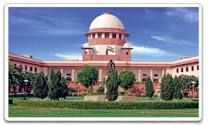http://www.firstpost.com/business/as-parliament-readies-for-gst-debate-supreme-court-to-decide-on-entry-taxes-2899728.html
Are entry taxes unconstitutional?
Even as the Narendra Modi government prepares to give one big push to the Goods and Services Tax (GST) in the Monsoon Session of Parliament that began on Monday (18 July), a legal doorway has been opened up by the Supreme Court that might end up in large-scale changes to the taxation regimes across the country.
In a far-reaching move, the Supreme Court has set up a nine-judge constitution bench to examine the validity of separate entry taxes on goods imposed by various state governments. Should the constitution bench agree with petitioners who have challenged various entry taxes – on the grounds that they restrict the free movement of goods – and strike them down as unconstitutional, it could actually make the GST proposals a reality without the bill having to be approved by Parliament.
The constitution bench will start the hearing on a day-to-day basis as early as this month.
The decision to set up a nine-member bench – one of the largest benches set up by the apex court to date – was possible after a three-judge bench headed by chief justice T S Thakur took note of the entry tax provisions of various states.
Some large companies have challenged these entry tax provisions on the ground that they are against the concept of free trade and commerce under Article 301 (Freedom of trade commerce and intercourse) of the Constitution.
The nine-member bench will comprise the Chief Justice himself, Justice A K Sikri, Justice S A Bobde, Justice Shiva Kirti Singh, Justice N V Ramana, Justice R Banumathi, Justice A M Khanwilkar, Justice D Y Chandrachud and Justice Ashok Bhushan.
Chief Justice Thakur, while constituting the bench, observed that “these matters have lingered. The time has come we must discuss (this issue)…There is no way we can escape this”.
He had noted how these cases were actually referred to a nine-judge Bench way back in 2010 by a Constitution Bench led by Justice SH Kapadia but remained unheard till date.
At stake is an important constitutional issue — whether the States have the right to levy entry tax on goods entering their respective territories. But the other constitutional issue is whether any party has the right to impede free movement of goods within the boundaries of a territory that is actually a single nation.
Can one or more states break up the smooth movement of commerce through the introduction of entry taxes? At stake is a large sum of around Rs 30,000 crore a year that is collected by states by way of entry tax. And this is the official sum. Unofficial collections could be equally large.
The outcome of this hearing will have huge ramifications for Municipal Corporation of Greater Mumbai (MCGM) which collects around Rs 7,500 crore annually through octroi levy – another form of entry tax. Considering that Mumbai has a budget of Rs 33,700 crore for 2015-16, the share of this entry tax alone accounts for around 20 percent.
Another state which has used the entry tax to fill private pockets is Uttar Pradesh, where no product can enter the state without filling up forms and paying taxes. Although the form itself costs just a rupee, transporters and companies must pay anywhere between Rs 5,000 and Rs 50,000 just to get the form and begin the process of paying the official entry tax. The private collections on account of this entry form alone is said to be enormous.
Yet another state that could get affected is Odisha which collects around Rs 1,600 crore annually through imposition of entry taxes.
The three-member bench observed that “Counsel for the parties submit that the main appeals/ petitions are all ripe for listing before a larger bench of nine-Judges. They submit that instead of dealing with the interim applications or directing any modification in the arrangement already made, it would be more appropriate if the appeals/petitions are set down for final hearing in the month of July, 2016. We accordingly direct that the papers shall be placed before the chief justice for constituting an appropriate bench to hear the main appeals/petitions in the month of July 2016.” Te apex court was thus clubbing some 2,000 cases filed in various courts, but dealing with the same issue of the constitutional validity of the levy of entry tax.
Today, thanks to the entry tax, vehicles are stopped at designated checkpoints for a few hours to a few days. This waiting period is one of the factors which compels transporters and companies to pay cash bribes at each check post to prevent any further harassment. Consequently, goods that should have taken a maximum of two days for covering the distance between Delhi to Mumbai, currently take almost 10-15 days. The increased number of days adds to the interest cost on delays and inventory pileup.
The entry tax mechanism has allowed each state to garner revenues both on as well as off the books. This is one of the reasons why the states have not been willing to sign up for the GST Bill. While the Bill provides for meeting any deficit in tax collections for a period of five years, there will be no way to compensate for the loss of income that party faithful get from cash collections at these entry points.
The three member bench has requested senior advocate Harish Salve, representing some companies in the matter, to file his submission on all issues involved.
“We make it clear that apart from the comprehensive compilation which Mr Salve proposes to file, each one of the counsel for the parties to these appeals/petitions shall file a brief of the submissions not exceeding 10 pages in each case . . .The submission shall be filed within six weeks… none of the counsel shall be permitted to seek any adjournment on the dates fixed for hearing,” stated the bench and fixed the matter for hearing on 18 July. No further notice regarding this needs be issued by the Registry. The Registry shall club all the connected matters and list them for final hearing before the larger Bench in the week commencing 18th July, 2016.
In doing so, the Supreme Court has done two remarkable things. No submission of the parties hall exceed 10 pages in length. Thus, the apex court has ensured that the judges are not swamped with thousands of pages of notes and annexures. Second, by ruling out adjournments, the Supreme Court is paving the way to speedy trials without adjournments.
So, critical as the GST debates in Parliament will be, the proceedings in the Supreme Court will be of no less import this month.







































COMMENTS